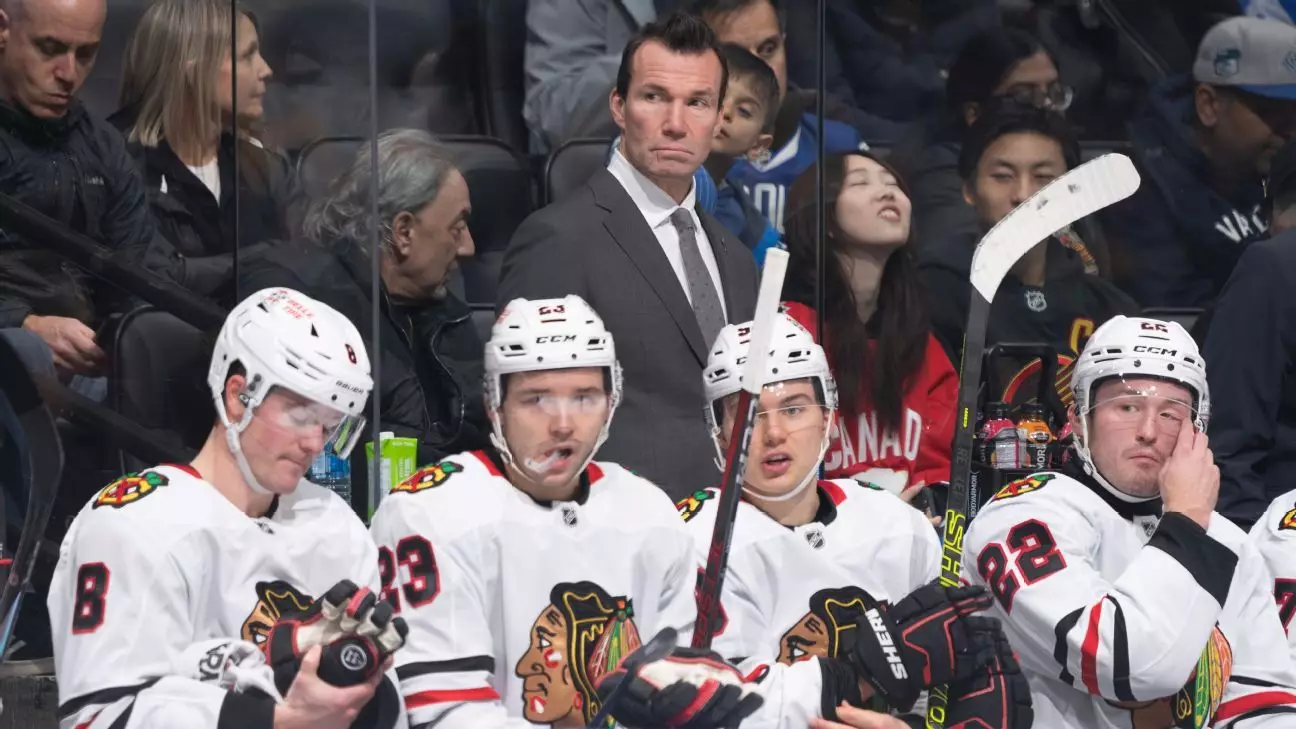The Chicago Blackhawks have taken a significant step towards revamping their team dynamics by parting ways with head coach Luke Richardson after three tumultuous seasons. As the franchise struggles with a rebuild in the wake of past successes, Richardson’s tenure, characterized by disappointing performance metrics, has ultimately led to his dismissal. The recent coaching change signals a determined effort from the Blackhawks’ management to realign their strategies and improve on an unsuccessful start to the current season.
In the wake of Richardson’s firing, Anders Sorensen, who has been coaching the AHL affiliate Rockford IceHogs, has been appointed as the interim head coach. This move follows a series of disappointing performances that saw the Blackhawks struggling to gain traction within the league. With Sorensen stepping in immediately, the team’s management has expressed confidence in his ability to elevate the club’s fortunes in the remainder of the season—a reflection of his solid reputation as a communicator and coach in Rockford.
Mark Eaton, the assistant general manager known for overseeing player development, will take over coaching responsibilities for the IceHogs, highlighting a strategic restructuring within the organization. The Blackhawks are set to assess Sorensen’s performance over the season before embarking on a comprehensive search for a permanent head coach.
During his tenure, Richardson amassed a disheartening record of 57 wins against 118 losses and 15 overtime losses. The Blackhawks’ recent performance exhibited a lack of execution on the ice, evidenced by their ranking as the worst team in the NHL with just eight victories out of 26 games this season. The team’s struggles were apparent on both ends of the ice, ranked low in both defense and offense while failing to foster a productive environment for emerging talents like Connor Bedard.
Bedard, who garnered attention as last season’s Rookie of the Year, has found himself grappling with expectations that may have been too lofty for the current status of the team. His diminished point total of merely five goals in 26 games signifies the broader struggles faced by the Blackhawks as they aim for an upturn amidst their rebuilding efforts.
General Manager Kyle Davidson articulated the rationale behind the coaching shake-up, underscoring the dissonance between the organization’s expectations and the actual results being produced on the ice. Davidson’s commitment to a higher level of execution evokes a sense of urgency as the Blackhawks seek to navigate away from the consistent disappointment that has defined their recent play.
Chairman and CEO Danny Wirtz echoed Davidson’s sentiments, offering his full support for the decision to change coaching staff and for the subsequent search for a new head coach. The collective frustration felt by players and management alike speaks to the systemic issues plaguing the team, issues that could only be exacerbated should changes not be implemented swiftly and effectively.
As the Blackhawks turn the page on Richardson’s era, the focus shifts to incorporating the promising talents within their pipeline. One player to watch is Frank Nazar, who is currently second in AHL scoring, demonstrating his readiness for the NHL. The Chicago organization hopes to nurture its prospects adequately before making the crucial decision to call them up—a balance that could significantly impact their future performance as a team.
The move to bring in Sorensen reflects the organization’s dual commitment to supporting their young players and revamping their overall strategy at the NHL level. With Sorensen’s coaching history in development roles and prior head coaching success in the AHL, there is a glimmer of hope for revitalizing the Blackhawks’ competitive edge.
The decision to fire Richardson symbolizes a critical moment in the Chicago Blackhawks’ ongoing journey through rebuild and recovery. By appointing Sorensen as the interim head coach, management appears poised to reassess and recalibrate their approach, thereby fostering a culture of ambition and resilience. In an era defined by challenges, the intention to seek further growth and undertaking an expansive search for a permanent head coach may ultimately define the trajectory and identity of this storied NHL franchise for seasons to come.

